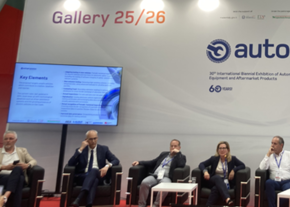
09/03/2023
EU ban on endothermic engines: the vote in the EU Council has been postponed. To an undetermined date
Francesca Del Bello
A revision of the text might be necessary. Italian Minster for the Environment: "we wish this pause leads other countries and institutions to a further reflection”
The race towards the electrification of the vehicle fleet slows down. The discussion on the ban of new production cars and light commercial vehicles with endothermic engines had received the positive vote by the European Parliament on February 14th: the Regulation had then to be discussed at the EU Council before being published in the Official Journal of the European Union – the final act of the legislative process at European level. But the discussion at the EU Council has been postponed to a later date. The announcement arrives via Twitter directly from Daniel Holmberg, spokesman for COREPER, the committee that brings together the permanent representatives to the EU and which is in charge of preparing the work of the Council of the European Union. In His tweet, Holmberg explained that the committee "will return to the question in due time".
The decision has taken into account the doubts expressed by some European governments, including Italy. In fact, the Italian Minister of the Environment and Energy Security Gilberto Pichetto had already declared at the end of February that Italy would have voted against the proposal to ban endothermic engines, claiming that "environmental targets must be pursued through an economically sustainable and socially equitable transition, planned and guided with great attention, to avoid negative implications for the country both in terms of employment and production". Italian position is thus that of promoting a logic of technological neutrality - the simultaneous assessment of all the technologies currently available – when assessing the possible solutions to achieve the goal of decarbonisation. This position was shared by Poland, who opposed to the adoption of the Regulation in its present form, while Bulgaria declared its abstention from the vote. However, it was Germany who determined the definitive postponement (after two attempts to reschedule the discussion), still divided between the convinced supporters of the endothermic engine block in 2035 and those more inclined to a revision of the Regulation towards a greater openness in favour of alternative forms of power supply. If all four countries had voted against the Regulation during the discussion at the EU Council, it would have run into the so-called blocking minority, sufficient to prevent the adoption of the Regulation itself. Hence the decision by the Corepar to pause the process, allowing the states to continue their negotiations before bringing the Regulation to the final vote.
Italy's reaction was positive, with Minister Pichetto's comment defining the approach of the Regulation as "too ideological and not very concrete" and continuing: "Italy has a very clear position: electricity cannot be the only solution of the future, especially if it continues […] to be a supply chain for the few. Furthermore, focusing on renewable fuels - explains the Minister - is a strategic and equally clean solution, which makes it possible to achieve important environmental results while avoiding heavy negative impact in terms of employment and production", hoping that the pause in the negotiations will be useful "also for other countries and to the European institutions for a further reflection on such an important issue for citizens and businesses”.
The decision has taken into account the doubts expressed by some European governments, including Italy. In fact, the Italian Minister of the Environment and Energy Security Gilberto Pichetto had already declared at the end of February that Italy would have voted against the proposal to ban endothermic engines, claiming that "environmental targets must be pursued through an economically sustainable and socially equitable transition, planned and guided with great attention, to avoid negative implications for the country both in terms of employment and production". Italian position is thus that of promoting a logic of technological neutrality - the simultaneous assessment of all the technologies currently available – when assessing the possible solutions to achieve the goal of decarbonisation. This position was shared by Poland, who opposed to the adoption of the Regulation in its present form, while Bulgaria declared its abstention from the vote. However, it was Germany who determined the definitive postponement (after two attempts to reschedule the discussion), still divided between the convinced supporters of the endothermic engine block in 2035 and those more inclined to a revision of the Regulation towards a greater openness in favour of alternative forms of power supply. If all four countries had voted against the Regulation during the discussion at the EU Council, it would have run into the so-called blocking minority, sufficient to prevent the adoption of the Regulation itself. Hence the decision by the Corepar to pause the process, allowing the states to continue their negotiations before bringing the Regulation to the final vote.
Italy's reaction was positive, with Minister Pichetto's comment defining the approach of the Regulation as "too ideological and not very concrete" and continuing: "Italy has a very clear position: electricity cannot be the only solution of the future, especially if it continues […] to be a supply chain for the few. Furthermore, focusing on renewable fuels - explains the Minister - is a strategic and equally clean solution, which makes it possible to achieve important environmental results while avoiding heavy negative impact in terms of employment and production", hoping that the pause in the negotiations will be useful "also for other countries and to the European institutions for a further reflection on such an important issue for citizens and businesses”.










